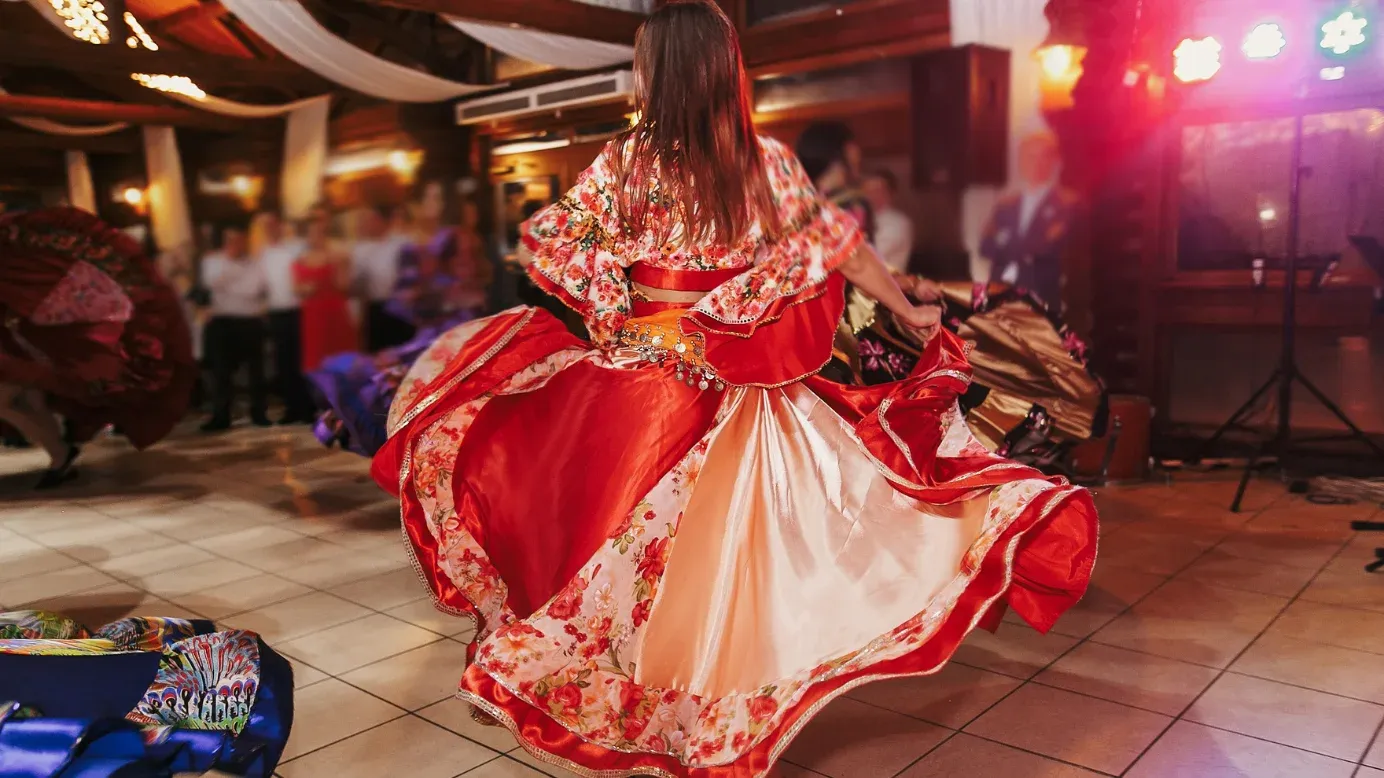Table of Contents
As the sun rises on a crisp autumn morning, and the office is bathed in a warm, golden glow, there's a sense of anticipation in the air. Desks are adorned with red and black accents, colleagues chatter excitedly about the day's plans, and the aroma of freshly baked baklava wafts through the break room.
It's not just any ordinary day at the workplace; it's Albania's Independence Day, and the spirit of patriotism is alive and well within these office walls.
Let’s embark on a unique journey as we explore the significance of Albania's flag, delve into the rich history of its independence, and discover the wonderful ways in which this vibrant nation's traditions have found their way into our workplace, fostering unity and celebrating diversity.
Join us as we unfurl the colors of Albania's flag and share the story of a nation's struggle and triumph, all within the confines of our professional domain.
History of Albania Independence Day
Albania Independence Day, known as "Dita e Pavarësisë," celebrates Albania's declaration of independence from the Ottoman Empire on November 28, 1912. This marked the culmination of a long struggle for self-determination and sovereignty.
Here is a brief overview of the history leading up to Albania's Independence Day:
- Ottoman rule: For nearly 500 years, Albania was under Ottoman rule. During this period, there were sporadic revolts and uprisings, but it wasn't until the late 19th and early 20th centuries that a concerted effort for independence began.
- Albanian National awakening: In the late 19th century, an intellectual and political movement known as the Albanian National Awakening emerged. It aimed to promote Albanian national consciousness and foster a sense of unity among the various Albanian-speaking communities.
- League of Prizren (1878): The League of Prizren was a political organization formed in the city of Prizren (now in modern-day Kosovo) in 1878. It sought to defend the territorial integrity and autonomy of Albanian-populated lands from partition by neighboring powers.
- Congress of Manastir (1908): This congress, held in the town of Manastir (nowadays Bitola in North Macedonia), played a crucial role in standardizing the Albanian language and promoting a unified national identity. It established the modern Albanian alphabet, which is still in use today.
- Young Turk Revolution (1908): The Young Turk Revolution led to the establishment of a constitutional government in the Ottoman Empire. This brought some hope for reforms, but Albanian aspirations for autonomy were not met.
- Declaration of Independence (1912): On November 28, 1912, in the city of Vlorë, Ismail Qemali, a prominent Albanian leader, declared the independence of Albania from the Ottoman Empire. The declaration marked the end of centuries of Ottoman rule and the beginning of a new era for Albania.
- International recognition: The newly declared state of Albania sought international recognition, which was achieved gradually over the following months. The Great Powers of Europe, including Austria-Hungary, Italy, and Russia, recognized Albania's independence.
- Challenges and conflicts: The early years of Albanian independence were marked by internal strife, territorial disputes, and external threats. Albania faced challenges from neighboring countries and dealt with issues related to the delineation of its borders.
Albania's Independence Day, celebrated on November 28th each year, is a national holiday commemorating this historic event. It is a day of reflection on Albania's struggle for independence and a celebration of its sovereignty as a nation. Various events, ceremonies, and cultural activities take place across the country to mark this important occasion.
What is the significance of Albania Independence Day?
Albania Independence Day, celebrated on November 28th, holds great significance for several reasons:
- End of Ottoman rule: It marks the end of nearly 500 years of Ottoman rule over Albania. The declaration of independence signaled the beginning of a new era for the Albanian people, free from foreign domination.
- National identity and unity: Albania Independence Day is a celebration of the establishment of a unified Albanian state. It solidified the sense of national identity among Albanians, bringing together various linguistic, religious, and cultural groups under a common flag.
- Symbol of sovereignty: The declaration of independence affirmed Albania's status as a sovereign and independent nation on the world stage. It allowed Albania to pursue its own political, economic, and social development without external interference.
- Recognition by great powers: The recognition of Albania's independence by major European powers, including Austria-Hungary, Italy, and Russia, provided a diplomatic foundation for Albania's existence as a nation-state.
- Cultural and linguistic standardization: The Congress of Manastir in 1908 played a crucial role in standardizing the Albanian language and creating a unified literary form. This linguistic unity helped foster a stronger sense of national cohesion.
- Inspiration for future generations: Albania Independence Day serves as a source of inspiration for future generations, reminding them of the sacrifices made by their forebears in the pursuit of freedom and self-determination.
- Resilience and determination: The history leading up to Albania's independence is marked by various uprisings, movements, and leagues aimed at achieving self-rule. The successful declaration of independence reflects the resilience and determination of the Albanian people in their struggle for freedom.
- Cultural and historical heritage: The celebration of Independence Day also provides an opportunity to showcase and celebrate Albania's rich cultural heritage, including its traditions, music, dance, and cuisine.
- Unity in diversity: Albania is a diverse country with a range of religious, linguistic, and cultural communities. Independence Day serves as a reminder that despite this diversity, the Albanian people share a common history and destiny.
- International relations: Independence Day is an occasion to reaffirm Albania's commitment to the principles of international cooperation, peace, and sovereignty. It is an opportunity for Albania to strengthen its diplomatic ties with other nations.
20 Albania Independence Day interesting facts
Here are 20 interesting facts about Albania Independence Day:
- Declaration of independence: Albania declared its independence from the Ottoman Empire on November 28, 1912, in the city of Vlorë.
- Ismael Qemali: Ismael Qemali, a prominent Albanian leader and politician, played a central role in the declaration of independence. He became the first Prime Minister of Albania.
- Unique alphabet: The Albanian language is unique and not related to any other Indo-European language. The modern Albanian alphabet was standardized at the Congress of Manastir in 1908.
- Older than Italy: Albania is one of the oldest countries in Europe. It predates Italy, which was unified in the 19th century.
- Cultural diversity: Albania is known for its religious diversity, with a significant proportion of the population being Muslim, along with Christian and other religious communities.
- Bunkers: Albania has a unique architectural feature: thousands of bunkers, a legacy of Enver Hoxha's regime, which built them during the Cold War.
- Mother Teresa: Although born in Skopje (modern-day North Macedonia), Mother Teresa, the Nobel laureate and humanitarian, had Albanian roots.
- Ancient Illyria: The region that is now Albania was once part of Ancient Illyria, an area inhabited by the Illyrian tribes, known for their fierce independence.
- King Zog I: Albania was briefly a monarchy under King Zog I, who ruled from 1928 to 1939. He was the only king of Albania.
- Occupied in World War II: Albania was occupied by Italy during World War II and later by Nazi Germany. The communist partisans led by Enver Hoxha played a significant role in resisting the occupation.
- Enver Hoxha's Regime: Enver Hoxha, a communist leader, ruled Albania from 1944 until his death in 1985. His regime was known for its isolationist policies and extreme ideology.
- Religious suppression: Under Hoxha's rule, Albania became officially atheist, with religious practices being heavily restricted. Many religious buildings were repurposed or destroyed.
- UNESCO sites: Albania boasts several UNESCO World Heritage Sites, including the ancient city of Butrint, Gjirokastër's historic center, and the ancient city of Berat.
- Independence monuments: In Vlorë, where the declaration of independence took place, there's a monument called "Monument of Independence" to commemorate the event.
- Flag symbolism: The Albanian flag features a double-headed eagle, a symbol of strength and bravery. It's one of the oldest national flags still in use.
- National Anthem: The Albanian national anthem, "Himni i Flamurit" (Hymn to the Flag), was written by Asdren, a prominent Albanian poet, and composer Ciprian Porumbescu.
- Independence celebrations: Albania Independence Day is marked with various events, including flag-raising ceremonies, cultural performances, and fireworks displays.
- Albanian Diaspora: Albanians form a significant diaspora around the world, particularly in countries like Italy, Greece, Turkey, and the United States.
- Growth of tourism: Albania's coastline along the Adriatic and Ionian Seas, along with its rich history, has been attracting an increasing number of tourists in recent years.
- Euro-Atlantic integration: Albania has been working towards Euro-Atlantic integration, seeking membership in institutions like the European Union and NATO.
5 Flag and Independence Day activities for the workplace
1. Flag decoration contest
Encourage employees to showcase their creativity by decorating their workspaces or a designated area with Albanian flags and patriotic-themed decorations. Set up a contest with prizes for the most creative and visually appealing displays. This activity fosters team spirit and a sense of pride in the workplace.
2. Cultural Potluck

Organize a potluck lunch or breakfast where employees bring in traditional Albanian dishes to share with their colleagues. This not only celebrates the country's culinary heritage but also provides an opportunity for employees to learn about each other's cultural backgrounds.
3. Trivia quiz about Albania
Host a fun and informative trivia quiz focused on Albanian history, culture, and Independence Day facts. This activity promotes learning and team bonding while also instilling a sense of appreciation for Albania's heritage.
4. Flag raising ceremony
Organize a brief flag-raising ceremony at the workplace, where employees gather to witness the hoisting of the Albanian flag. This ceremonial act serves as a symbolic gesture of respect for the nation's independence and unity.
5. Charitable outreach

Encourage employees to participate in a charitable initiative related to Independence Day. This could include activities like organizing a donation drive for a local community organization, volunteering at a shelter, or participating in a community clean-up. It's a meaningful way to give back to the community while celebrating the spirit of independence.
5 Flag and Independence Day workplace celebration ideas
1. Flag-themed dress code
Encourage employees to wear clothing with the colors of the Albanian flag (red and black) or clothing featuring the flag itself. This creates a visual representation of patriotism and unity in the workplace.
2. Cultural display booths
Set up booths or stations where employees can display items related to Albanian culture, history, and traditions. This could include artifacts, photos, or presentations that highlight the significance of Independence Day.
3. Albanian music and dance performance

Arrange for a performance featuring traditional Albanian music and dance. This can be a lively and engaging way to celebrate the cultural heritage of Albania.
4. Independence Day luncheon

Organize a special lunch or catered event featuring traditional Albanian cuisine. This not only introduces employees to delicious flavors but also provides an opportunity for them to learn about the culinary heritage of Albania.
5. Guest speaker or presentation
Invite a guest speaker, such as a historian, cultural expert, or representative from the Albanian community, to give a presentation about Albania's history, the significance of Independence Day, or aspects of Albanian culture. This educational session can be both informative and inspiring for employees.
30 Quotes on Albania Independence Day
Here are 30 quotes on Albania Independence Day:
- Today, we celebrate the spirit of freedom and the strength of a united nation. Happy Independence Day, Albania!
- In unity, we found our strength; in independence, we found our voice.
- Albania's Independence Day is a reminder that even the smallest nation can stand tall in the pursuit of freedom.
- The flame of freedom burns eternal in the hearts of Albanians. Happy Independence Day!
- Independence is not a gift, but a right earned through the struggles of a determined people.
- A nation's independence is its most precious treasure. Let us cherish and protect it.
- Albania's journey to independence is a testament to the power of resilience and unity.
- Today, we honor the heroes who fought for Albania's freedom and salute the generations that continue to carry the torch of independence.
- Independence is the foundation upon which a nation's destiny is built.
- Let the red and black of our flag be a reminder that our unity is our strength.
- Albania's Independence Day is a celebration of the unwavering spirit that brought forth a free nation.
- In every heart that beats for Albania, the flame of independence burns bright.
- Freedom is not given, it is won. Albania's Independence Day reminds us of the price paid for liberty.
- The strength of a nation lies in the character of its people. Happy Independence Day, Albania!
- Today, we raise our flag high, for it stands as a symbol of our triumph over adversity.
- The spirit of independence is etched in the hearts of every Albanian, binding us together as one.
- May the legacy of our forefathers be a guiding light for future generations. Happy Independence Day!
- Independence is the birthright of every nation. Today, we celebrate Albania's.
- The flag of Albania is a beacon of hope, a testament to the indomitable spirit of its people.
- In the heart of every Albanian beats the rhythm of freedom. Happy Independence Day!
- Today, we honor the sacrifices of the past, as we march forward with hope for the future.
- Independence is the soul's right to breathe. Albania, you are free.
- Albania's Independence Day reminds us that unity can overcome any obstacle.
- Let us stand tall, for we are the heirs of a free and independent Albania.
- Independence is the cornerstone of a nation's identity. Happy Independence Day, Albania!
- In the tapestry of nations, Albania's story is woven with threads of courage and determination.
- Today, we salute the heroes who paved the way for Albania's independence.
- Freedom is the song of the soul, and Albania sings it proudly.
- With the red and black, we paint the canvas of our independence. Happy Independence Day!
- Albania, a nation born from the fires of freedom. Happy Independence Day!
Conclusion
In conclusion, Albania's flag and Independence Day have not only become a symbol of pride and unity in our workplace but also a testament to the enduring spirit of this remarkable nation.
As we wrap up our celebration, let's remember that even within the corporate world, we can come together to honor the cultural heritage and historical achievements that make our diverse team stronger.
So, whether it's through flag decorations, shared stories, or a delightful slice of baklava, let's continue to embrace the beauty of diversity and the power of unity in our workplace.
Happy Independence Day, Albania! 🎉


